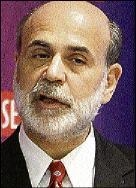Bernanke says US recession might end in '09
Published: Wednesday | February 25, 2009

United States Federal Reserve chairman Ben Bernanke delivers a speech to the London School of Economics in London, on January 13. In testimony, Bernanke said the US recession could end this year, lifting Wall Street. - Ap
Federal Reserve Chairman Ben Bernanke has steadied Wall Street by telling Congress the recession would end this year.
Bernanke, making his semi-annual report to the Senate Banking Committee, said the economy is likely to keep contracting in the first six months of 2009 - hardly a surprise to Wall Street. But he also said the recession will end this year and that he would use all available tools to help end it.
Bernanke's comments helped the market absorb a worrisome report on consumer spending. The Conference Board's consumer confidence index for February came in at 25, well below expectations. The finding is the latest sign that consumers are deeply worried about the recession and the safety of their jobs.
Expanding ownership stakes
The Fed chairman spoke a day after the government moved closer to dramatically expanding its ownership stakes in the nation's banks, including Citigroup Inc. The Treasury Department, the Fed and other banking regulators said Monday they could convert the government's stock in the banks from preferred shares to common shares.
The market was up a day after another sharp drop in stocks that left the Dow Jones industrial average and the Standard & Poor's 500 index near 12-year lows. In late morning trading, the Dow rose 86.34, or 1.2 per cent, to 7,201.12.
Broader stock indicators also rose. The S&P 500 index rose 10.84, or 1.5 per cent, to 754.17, and the Nasdaq composite index rose 22.73, or 1.6 per cent, to 1,410.45.
The Russell 2000 index of smaller companies rose 7.20, or 1.8 per cent, to 401.78.
Volatile market
Advancing issues outnumbered decliners by about three-to-two on the New York Stock Exchange, where volume amounted to 404.4 million shares.
Many analysts expect the market to remain volatile for the foreseeable future.
Ryan Larson, head of equity trading at Voyageur Asset Management, said the market is looking for insights into the Treasury Department's plans to "stress test" the banks and remove the toxic assets from their books.
"The market is desperately looking for more clues to piece together this bailout," he said.
Investors are focused on Bernanke's comments, he said, but particularly curious about what President Barack Obama had to say during his address to the nation yesterday. He was expected to make the case that more had to be done to revive the US economy.
Rebounds from sell-offs
Rich Hughes, co-president of Portfolio Management Consultants in Los Angeles, said any rallies are likely to be based on hope or on rebounds from sell-offs. He contends Wall Street still hasn't seen the wrenching decline that is often needed to scare investors from the market and set the ground for a lasting recovery.
"The underlying fundamentals just aren't there to support anything that's sustainable right now," he said. "We haven't seen the capitulation that you'd want to see before you'd get thoroughly enthused."
Some bargain-hunting often follows steep drops in the market. On Monday, all the major indexes tumbled more than three per cent. The Dow Jones industrial average fell 251 points to its lowest close since May 7, 1997, while the Standard & Poor's 500 index logged its lowest finish since April 11, 1997.
- AP












